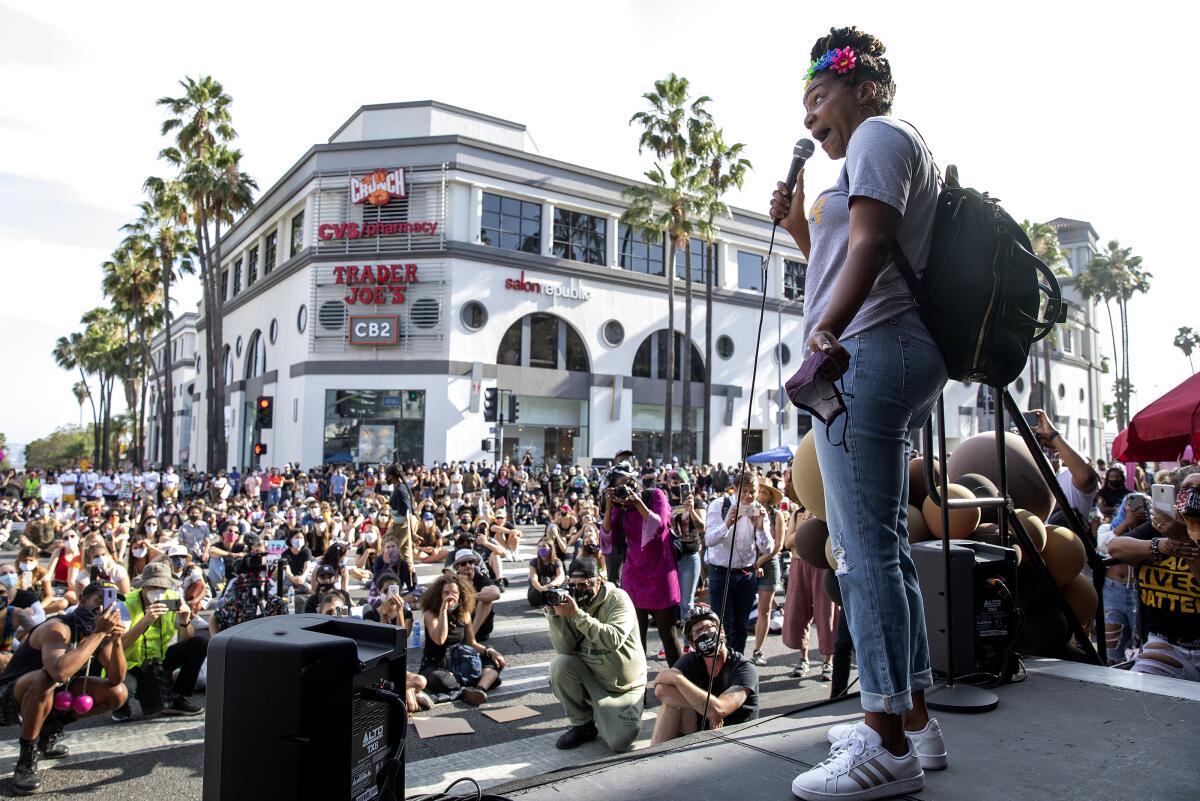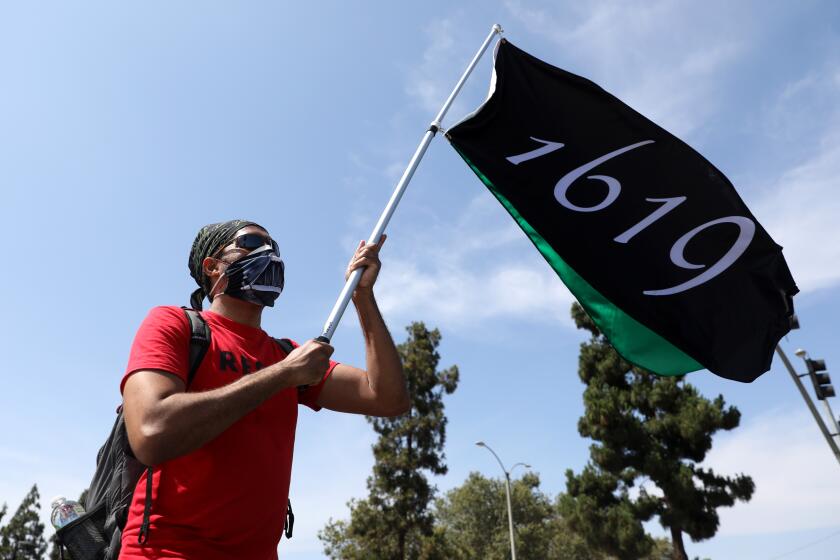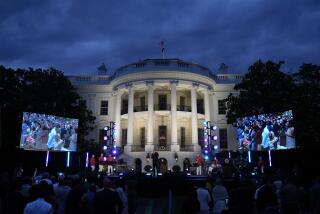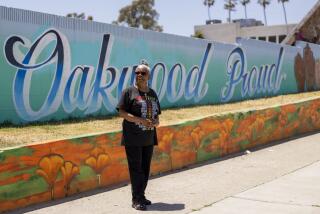Op-Ed: The California connection to Juneteenth you probably didn’t learn in school

- Share via
Any commemoration of emancipation is important and relevant, but as a fourth-generation Californian and a Black American drawn to history, I used to wonder: What does Juneteenth, which celebrates the end of slavery in Texas, have to do with me?
I always thought that “Juneteenth” was a clever portmanteau of a word, combining “June” and the “19th” into a weighted symbol of the U.S.’ racial and political past. It marks the date in 1865 when a Union Army general arrived with troops in Galveston, Texas, to put down the resistance of slaveholders and officially proclaim the end of slavery — more than two years after the Emancipation Proclamation. In Texas, slaveholding cotton planters and white supremacists began a violent backlash, but newly emancipated Black people defiantly rejoiced.
What I’ve learned is that California and Texas share a connection to the emancipation theme of Juneteenth. Both states were born of the politics of slavery. California entered the U.S. in 1850 as a “free state” in a congressional compromise that resulted in the Fugitive Slave Act being devastatingly overhauled; it required slaves be returned to their owners, even if they were in a free state. Texas had been admitted five years earlier as a slave state — white founders such as Stephen Austin and Sam Houston were slaveholders, and its constitution firmly entrenched slavery in Texas law and society.
Despite the intolerance of slavery outlined in California’s constitution, our state was what historian Ira Berlin would call a “society with slaves.” Many Southern slaveholders had migrated to the state. The enslavement of African Americans and Native Americans in California was “one form of labor among many” in a state where slaveholders and their supporters held public sway. One early California settler observed that “From 1849 to 1861, the State of California was … as intensely Southern as Mississippi or any of the other fire-eating States.”
Over the years, quite a few people have insisted to me that there was no slavery in California. I respond that the practice of slavery isn’t generally taught in schools, interpreted at historic sites or really considered by most historians. But it is amply documented.
If there was no slavery, the California Legislature wouldn’t have passed its own strict fugitive slave law in 1852. Newspapers carried eyewitness reports of bloody whippings and people being forcibly held by slave owners. Court documents revealed enslaved people purchasing their manumission, newspapers carried ads by slaveholders searching for escapees and journalists covered lawsuits by plaintiffs suing for freedom.
The political attack on critical race theory is all about avoiding the truth of American history and events like Juneteenth.
Slavery in California didn’t end on its own. The Black community was the main protagonist in the state’s anti-slavery efforts, and the history of African Americans in the formative first 15 years of California statehood is suffused with all-out activism to abolish slavery and gain equality.
The effort included sermons preached from the pulpits of Black churches, year-round civil rights organizing by the Conventions of Colored Citizens of California and the exhortations of the state’s African American newspapers. This little-acknowledged past increases the significance of Juneteenth for Californians.
In Texas, even the defeat of the South that ended the Civil War didn’t halt slavery. After the Confederate surrender, as the country was in the process of ratifying the 13th Amendment, Union Gen. Gordon Granger was dispatched to Texas with 2,000 troops to gain control over rebel cotton plantation owners who continued to coerce Black labor. Representing the authoritative victor in the most significant war in U.S. history, Granger made a proclamation that was especially directed at whites: “All slaves are free.”
Within a year, many African Americans in Texas began creating hundreds of all-Black settlements across the state. From those hamlets, and in cities such as Austin and Fort Worth, Black Texans initiated Juneteenth in 1866, their commemorations transforming a shameful history of white supremacy into celebrations of freedom.
In the 20th century, one of the main tributaries of the river of African American migration was from Louisiana and Texas to California and other Western states, where the new arrivals often aspired to leading roles in civic life, according to author Isabel Wilkerson. Among the Texan migrants to California who made history were Tom Bradley, the first African American mayor of Los Angeles, and Willie Brown, the first African American mayor of San Francisco.
As Black Texans moved to California, they brought Juneteenth with them, although the commemoration wasn’t officially recognized in California until 2003. Some employers, including Twitter and Target, have made it a paid holiday.
Juneteenth isn’t a Black holiday, it’s an American holiday — and now a federal holiday after Congress voted overwhelmingly this week to make it one and President Biden signed the bill into law Thursday. A national observance will remind all Americans to contemplate the meaning of emancipation and shine a light on racial injustice. More than anything, a truly national holiday will allow all of us to participate in what one scholar called the “moment of indescribable joy” experienced on that first June 19, one hundred fifty-six years ago.
Susan D. Anderson is history curator and program manager at the California African American Museum. She is completing a book on “African Americans and the California Dream.”
More to Read
A cure for the common opinion
Get thought-provoking perspectives with our weekly newsletter.
You may occasionally receive promotional content from the Los Angeles Times.











